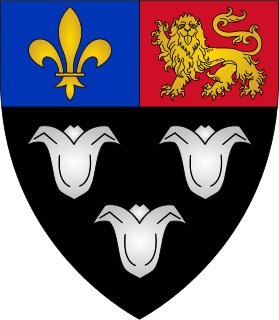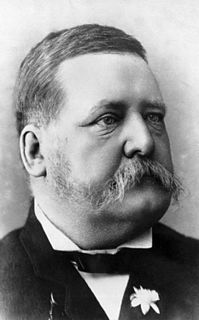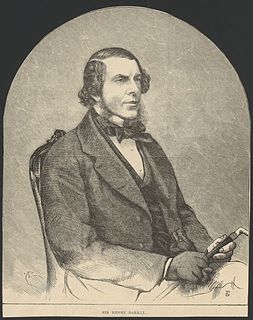Henry Pares Venables (b. 1830 in London – d. 31 December 1890 at Fordingbridge near Bournemouth) was an Australian educationist and school inspector. [1]

Fordingbridge is a town and broader civil parish with a population of 6,000 on the River Avon in the New Forest District of Hampshire, England, near to the Dorset and Wiltshire borders and on the edge of the New Forest, with museum and a late medieval 7-arch bridge. It is 81 miles (130 km) southwest of London, and 10 miles (16 km) south of the city of Salisbury. Fordingbridge is a former market town. The Avon Valley Path passes through the town. The town excluding linear settlement Sandleheath has a density of 30.2 persons per hectare.
Venables was educated at Eton College and Exeter College, Oxford, (B.A., 1853). Desiring to try his luck on the goldfields, Venables arrived in Melbourne in the Gauntlet with Henry Kingsley on 3 December 1853. [1]

Eton College is an English 13–18 independent boarding school and sixth form for boys in the parish of Eton, near Windsor in Berkshire. It was founded in 1440 by King Henry VI as The King's College of Our Lady of Eton besides Wyndsor, as a sister institution to King's College, Cambridge, making it the 18th-oldest Headmasters' and Headmistresses' Conference school.

Exeter College is one of the constituent colleges of the University of Oxford in England and the fourth oldest college of the University.

Melbourne is the capital and most populous city of the Australian state of Victoria, and the second most populous city in Australia and Oceania. Its name refers to an urban agglomeration of 9,992.5 km2 (3,858.1 sq mi), comprising a metropolitan area with 31 municipalities, and is also the common name for its city centre. The city occupies much of the coastline of Port Phillip bay and spreads into the hinterlands towards the Dandenong and Macedon ranges, Mornington Peninsula and Yarra Valley. It has a population of approximately 4.9 million, and its inhabitants are referred to as "Melburnians".
Venables was appointed Secretary to the Education Department of Victoria on the initiation of the free, secular and compulsory system under the Act passed by the late Mr. Justice James Wilberforce Stephen. [2]
Works published by Venables include: Outline of the Geography of Victoria, for the Use of Schools (1861), Syllabus of Parsing and Analysis … for the Pass Examination at Matriculation (1882, 1885, 1887, 1890), and maps of Australasia, Malaysia and Western Polynesia (1870, 1874), and New Zealand (1870). [1]











